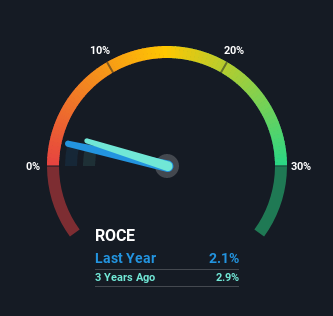- Hong Kong
- /
- Gas Utilities
- /
- SEHK:392
The Returns On Capital At Beijing Enterprises Holdings (HKG:392) Don't Inspire Confidence

If you're not sure where to start when looking for the next multi-bagger, there are a few key trends you should keep an eye out for. Firstly, we'd want to identify a growing return on capital employed (ROCE) and then alongside that, an ever-increasing base of capital employed. Ultimately, this demonstrates that it's a business that is reinvesting profits at increasing rates of return. However, after investigating Beijing Enterprises Holdings (HKG:392), we don't think it's current trends fit the mold of a multi-bagger.
What is Return On Capital Employed (ROCE)?
For those that aren't sure what ROCE is, it measures the amount of pre-tax profits a company can generate from the capital employed in its business. Analysts use this formula to calculate it for Beijing Enterprises Holdings:
Return on Capital Employed = Earnings Before Interest and Tax (EBIT) ÷ (Total Assets - Current Liabilities)
0.021 = HK$3.4b ÷ (HK$218b - HK$59b) (Based on the trailing twelve months to June 2021).
So, Beijing Enterprises Holdings has an ROCE of 2.1%. Ultimately, that's a low return and it under-performs the Gas Utilities industry average of 8.9%.
See our latest analysis for Beijing Enterprises Holdings

Above you can see how the current ROCE for Beijing Enterprises Holdings compares to its prior returns on capital, but there's only so much you can tell from the past. If you'd like to see what analysts are forecasting going forward, you should check out our free report for Beijing Enterprises Holdings.
How Are Returns Trending?
When we looked at the ROCE trend at Beijing Enterprises Holdings, we didn't gain much confidence. Over the last five years, returns on capital have decreased to 2.1% from 3.0% five years ago. However, given capital employed and revenue have both increased it appears that the business is currently pursuing growth, at the consequence of short term returns. If these investments prove successful, this can bode very well for long term stock performance.
The Bottom Line
While returns have fallen for Beijing Enterprises Holdings in recent times, we're encouraged to see that sales are growing and that the business is reinvesting in its operations. However, despite the promising trends, the stock has fallen 15% over the last five years, so there might be an opportunity here for astute investors. As a result, we'd recommend researching this stock further to uncover what other fundamentals of the business can show us.
Beijing Enterprises Holdings could be trading at an attractive price in other respects, so you might find our free intrinsic value estimation on our platform quite valuable.
While Beijing Enterprises Holdings isn't earning the highest return, check out this free list of companies that are earning high returns on equity with solid balance sheets.
Valuation is complex, but we're here to simplify it.
Discover if Beijing Enterprises Holdings might be undervalued or overvalued with our detailed analysis, featuring fair value estimates, potential risks, dividends, insider trades, and its financial condition.
Access Free AnalysisHave feedback on this article? Concerned about the content? Get in touch with us directly. Alternatively, email editorial-team (at) simplywallst.com.
This article by Simply Wall St is general in nature. We provide commentary based on historical data and analyst forecasts only using an unbiased methodology and our articles are not intended to be financial advice. It does not constitute a recommendation to buy or sell any stock, and does not take account of your objectives, or your financial situation. We aim to bring you long-term focused analysis driven by fundamental data. Note that our analysis may not factor in the latest price-sensitive company announcements or qualitative material. Simply Wall St has no position in any stocks mentioned.
About SEHK:392
Beijing Enterprises Holdings
An investment holding company, engages in the gas, water, environmental, brewery, and other businesses in Mainland China, Germany, and internationally.
Undervalued second-rate dividend payer.
Market Insights
Community Narratives



